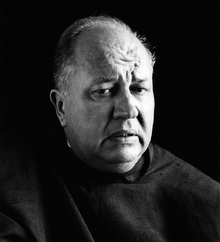Theodore Roethke facts for kids
Quick facts for kids
Theodore Roethke
|
|
|---|---|

Roethke in 1945
|
|
| Born | Theodore Huebner Roethke May 25, 1908 Saginaw, Michigan, U.S. |
| Died | August 1, 1963 (aged 55) Bainbridge Island, Washington, U.S. |
| Occupation |
|
| Alma mater | University of Michigan Harvard University |
| Genre | American poetry |
| Notable works | The Waking, The Lost Son, The Far Field, Words for the Wind |
| Notable awards | Pulitzer Prize, National Book Award |
Theodore Huebner Roethke (pronounced RET-kee; May 25, 1908 – August 1, 1963) was an important American poet. Many people consider him one of the best and most influential poets of his time.
He won the Pulitzer Prize for Poetry in 1954 for his book The Waking. He also won the National Book Award for Poetry twice. He won in 1959 for Words for the Wind and again in 1965 for The Far Field. This last award was given after he passed away.
Roethke's poems often explored his inner thoughts and feelings. They were known for their strong rhythm and vivid natural images. Poet James Dickey called him "the greatest poet this country has yet produced."
Theodore Roethke was also a respected poetry teacher. He taught at the University of Washington for fifteen years. Many of his students became famous poets themselves. Some even won Pulitzer Prizes for their work.
Contents
The Life of Theodore Roethke
Theodore Roethke was born in Saginaw, Michigan. He grew up near the Saginaw River. His father, Otto, was a German immigrant. He owned a large greenhouse with Theodore's uncle.
Young Theodore spent much of his childhood in this greenhouse. The plants and nature he saw there greatly influenced his poetry. These early experiences shaped many of his famous poems.
Education and Early Career
Roethke went to the University of Michigan. He earned his first degree with high honors in 1929. He later received a master's degree in English in 1936. He also briefly studied law.
He then continued his studies at Harvard University. There, he learned from the poet Robert Hillyer. Due to the Great Depression, he left graduate school. He began teaching English at several universities. These included Michigan State University and Pennsylvania State University.
Later Life and Teaching
While teaching at Michigan State University, Roethke faced some personal challenges. These experiences, however, often inspired his writing. His last teaching job was at the University of Washington. This connected him with many poets in the American Northwest.
He taught many students who became well-known poets. Some of them were James Wright, Carolyn Kizer, and Richard Hugo. His deep and personal style of poetry also influenced Sylvia Plath.
In 1952, Roethke received a special grant. He used this time to study philosophy and theology. He read works by thinkers like Sören Kierkegaard and Martin Buber.
In 1953, Roethke married Beatrice O'Connell. She had been one of his students. Beatrice was very supportive of him and his work. After he passed away, she helped publish his last poetry book, The Far Field. She also helped publish a book of his children's poems.
Theodore Roethke passed away in 1963. He was 55 years old. He had a heart attack while swimming on Bainbridge Island, Washington. The place where he died is now a peaceful rock garden. It is part of the Bloedel Reserve, a public garden.
Remembering Theodore Roethke
Theodore Roethke is remembered in several ways. There is a sign in Saginaw, Michigan, that honors his childhood home. It also marks his burial place.
The Friends of Theodore Roethke Foundation keeps his birthplace as a museum. You can visit it at 1805 Gratiot in Saginaw.
At the University of Washington, an auditorium is named after him. It is called Roethke Auditorium.
In Seattle, an alley was named Roethke Mews in his honor. It is near the Blue Moon Tavern, a place he used to visit.
In 2016, the Roethke Home museum looked for copies of his first book, Open House. They wanted to celebrate its 75th anniversary.
What Others Said About His Work
Many famous poets and critics admired Theodore Roethke's work. Stanley Kunitz, a two-time US Poet Laureate, said Roethke meant the most to him.
James Dickey believed Roethke was the greatest American poet. He felt Roethke had a unique and powerful energy in his poems.
Literary critic Harold Bloom included Roethke's Collected Poems on his list of essential books. He saw Roethke as one of the most talented poets of his generation.
Critic Camille Paglia included three of Roethke's poems in her 2006 book. This was more than any other 20th-century writer in her collection.
Roethke's book The Lost Son and Other Poems also received great praise. Critics said he found his true voice and main themes in this book. Many of the poems in this book are about his childhood greenhouse. They are known for being very detailed and realistic.
Film and Theatre About Roethke
Theodore Roethke's life and work have been featured in films and plays.
Film
- In a Dark Time: A Film About Theodore Roethke (1964). This film was directed by Dan Myers. It is about 25 minutes long.
- I Remember Theodore Roethke (2005). This film was produced by Jean Walkinshaw. It is about 30 minutes long.
Theatre
- First Class: A Play About Theodore Roethke (2007). This play was written by David Wagoner.
See also
 In Spanish: Theodore Roethke para niños
In Spanish: Theodore Roethke para niños
 | Audre Lorde |
 | John Berry Meachum |
 | Ferdinand Lee Barnett |

